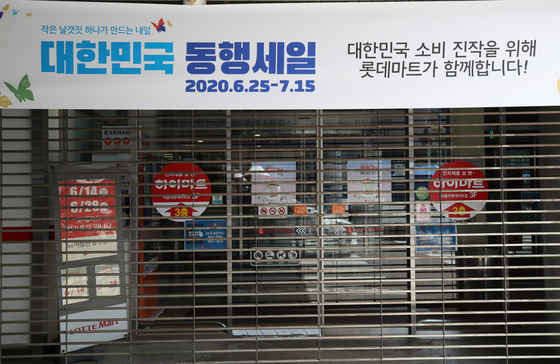
A large mart’s mandatory holiday in June of last year. yunhap news
A survey found that 6 out of 10 citizens objected to the mandatory holiday of hypermarkets. In particular, the younger they were in their 20s and 30s, the more they opposed the suspension of business. In addition, the opposition of the 20s and 30s regarding the movement of limiting the business hours of passports to online shopping malls such as Coupang and Market Curly was found to be particularly high.
According to the’Consumer Perception Survey on Distribution Regulations’ released by the National Federation of Businessmen on the 24th, 58.3% said that the mandatory closure of hypermarkets should be abolished or relaxed. 41.7% also said that the mandatory closure should be maintained (30.1%) and the number of holidays should be extended (11.6%). Hypermarkets have been obligated to take two days off a month since 2013. The purpose of the regulation is to induce consumers to buy goods in the surrounding traditional markets on the days of the mart’s holidays. The survey was commissioned by the FKI to a market research agency Mono Research and conducted on 1036 adult men and women nationwide.
When the mart is closed, only 8% of the traditional markets are used.
In this survey, to the question “Where do you buy daily necessities when a large supermarket near your home is not open”, 8.3% answered that they use the traditional market. On the contrary, many respondents said,’I do not buy the same day, but wait until the business day of a hypermarket and then buy’ (28.1%) or’Substitute an online purchase’ (14.7%). In response, the FKI argued that “the effect of protecting traditional markets from the obligatory holiday is not great, but rather, it could damage small business owners in marts and nearby shopping malls.”

Mangwon Market in Mapo-gu, Seoul. yunhap news
As a result of dividing the pros and cons of mart regulations by age group, it was found that dissent was high among those in their 20s and 30s. Responses against the regulation were highest in their 20s (72.0%), and the lowest in their 50s (50.7%). They were in their 40s (54.7%), over 60 (55.8%), and in their 30s (61.0%).
The survey also included pros and cons about regulations on online shopping platforms. Political circles centered on passports are reviewing business hours and restrictions on items handled on online shopping platforms such as Coupang and Market Kurly. In this survey, 81.0% of the respondents in their 20s were the highest. It was surveyed that the younger they were in their 30s (67.3%), in their 40s (50.2%), in their 50s (45.1%), and over 60 (42.1%).
The FKI analyzed that the results of this survey reflect the changing trends of lifestyle and shopping trends in their twenties. Kwon Hyeok-min, head of the FKI industrial strategy team, said, “The younger the time when offline shopping is concentrated on weekends, the more uncomfortable the regulation of mandatory distribution business closures. , As the traditional market feels far from the shopping place, it seems that the purpose of the mart regulation is not well conveyed. It seems that the consumption trend has changed.”
“Anxiety over future jobs is also superimposed”
Suh Chan-joo, a professor of business administration at Sookmyung Women’s University, said, “Consumption inconvenience is an immediate problem for those in their twenties. It seems to have worked.” The results of this survey are not to be regarded as showing individualistic tendencies in their twenties. It should be viewed as an answer that reflects their concerns about future job losses. Kim Seong-sook, a professor at Keimyung University’s Department of Consumer Information, said, “There are aspects in those in their 40s and 50s who are in their 40s and 50s, but those in their 20s and 30s aren’t. It seems to be a judgment,” he said.
Reporter Sunwook Choi [email protected]
